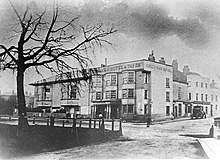Green Man, Blackheath
The Green Man was a public house on Blackheath Hill (now the A2), in Blackheath, London. It was an important stop for coach traffic owing to its position and was used as the headquarters of the Royal Blackheath Golf Club. It hosted "free-and-easy" music hall evenings in the 19th century and jazz and pop music in the 20th. It was a significant local landmark for over 300 years before its demolition in 1970.

Origins
The pub had existed since at least 1629.[2] It was reportedly named after Herne the Hunter who is believed to have had a group of worshippers in a cavern below the premises.[3] It became an important stop for coach traffic owing to its position at the top of Blackheath Hill and on the edge of the heath.[4] It was subsequently used as the headquarters of Royal Blackheath Golf Club, the oldest golf course in the world.[3]
19th century
The first recorded occasion of a toast to the "Immortal Memory" of Horatio Nelson was on Trafalgar Day (21 October), 1811 at the pub.[5]
During the 19th century, the pub took customers from the Chocolate House on Shooters Hill Road which had been a prominent local establishment during the eighteenth century. The Chocolate House subsequently closed.[1]
Madame Tussaud took her wax works show there on several occasions over three decades, the final one in late 1833 which was the kast before finding a permanent home in London. [6]
The Inn was also used as a postal collection point.[1]
Between 1850 and 1902 it held "free-and-easy" music hall evenings.[1]
In 1854, the bowling green to the rear of the pub was developed into properties, which now makes up part of Dartmouth Terrace.[7] In 1868, the inn was demolished and rebuilt in a grand Victorian style.[3] It housed a large function room that was used as a meeting place for various groups.[8]
20th century
During the early 1960s, the pub hosted the Jazzhouse Club, a popular jazz music venue run by Colin Richardson, who later managed the New Jazz Orchestra and Colosseum. Guests included Graham Bond, Tubby Hayes, Ronnie Scott, Manfred Mann, Ian Carr and Jon Hiseman.[9][10] Paul Simon played an early solo concert at the club as a last-minute replacement for Judy Collins.[9] A sixteen-year-old David Bowie (then billed as David Jones) was the saxophonist with the Konrads, his first professional band,[11] which was booked to play at the pub in 1963. Lead singer Roger Ferris cut himself on broken glass in the changing room and had to be hospitalised, so Bowie took over as lead singer for this and subsequent gigs.[12]
In 1970, the pub was demolished and replaced by Allison Close, a block of flats.[4]
See also
References
Citations
- Barker 1994, p. 100.
- Lewisham 2007, p. 10.
- Ramzan 2010, p. 30.
- Lewisham 2007, p. 48.
- "Nelson's Legacy". Royal Museums, Greenwich. Retrieved 9 October 2019.
- Cottrell 1965, p. 112.
- Lewisham 2007, p. 24.
- Weinreb et al. 2008, p. 74.
- Allen 2016, p. 177.
- "A tribute to John Hiseman". Chris Welch. Retrieved 9 October 2019.
-
- Sandford, Christopher (1997) [First published 1996]. Bowie: Loving the Alien. Time Warner. p. 28. ISBN 978-0-306-80854-8.
- "David Bowie: how a broken pint glass in a Blackheath pub changed the course of music history". The Daily Telegraph. 15 January 2016. Retrieved 9 October 2019.
Sources
- Allen, Carl (2016). London Gig Venues. Amberley. ISBN 978-1-445-65820-9.CS1 maint: ref=harv (link)
- Barker, Felix (1994). Greenwich and Blackheath Past. London: Historical Publications. ISBN 0-948-66755-9.CS1 maint: ref=harv (link)
- Ramzan, David (2010). Royal Greenwich Through Time. Amberley. p. 30. ISBN 978-1-445-63056-4.CS1 maint: ref=harv (link)
- Weinreb, Ben; Hibbert, Christopher; Keay, John; Keay, Julia (2008). The London Encyclopaedia (3rd ed.). Pan Macmillan. ISBN 978-1-405-04924-5.
- Blackheath Conservation Area Appraisal. London Borough of Lewisham (Report). March 2007. Retrieved 9 October 2019.
External links
- Green Man at pubwiki
- Transpontine: 1960s Jazz and R'n'B in Blackheath - contains information about the Jazzhouse Club in the Green Man